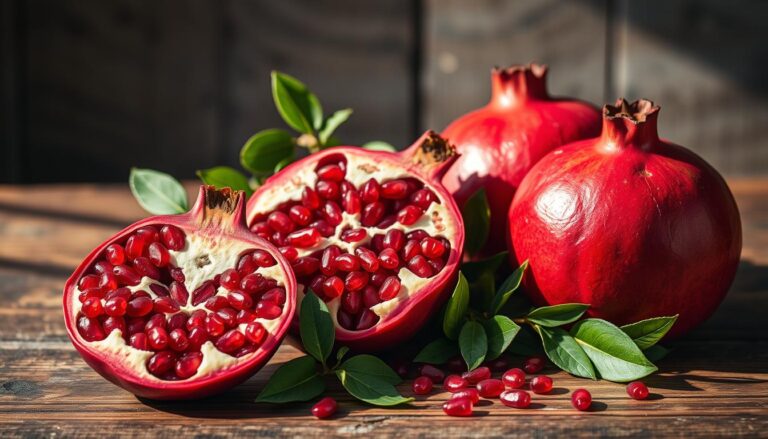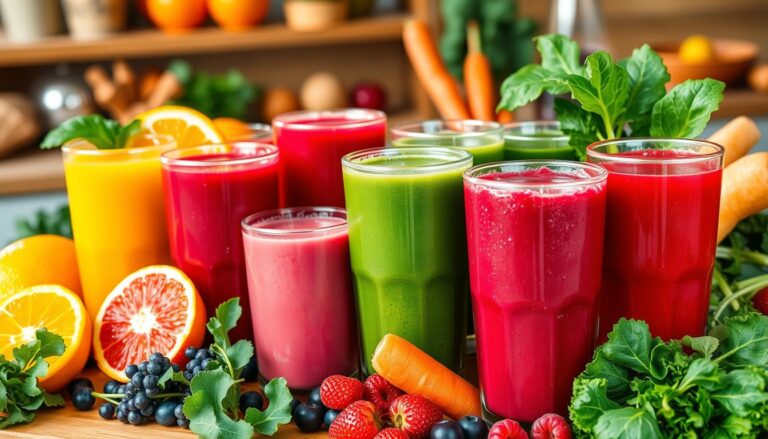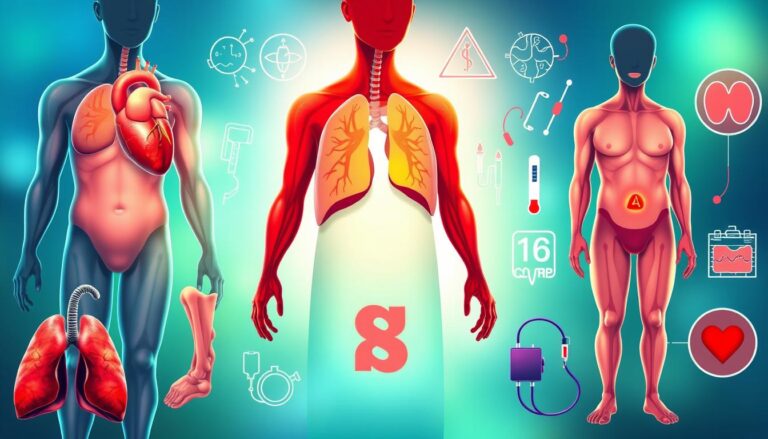Could changing your diet help reverse fatty liver disease? This condition affects up to 30% of Americans, making it a big health issue.
But what if eating the right foods could fix it? Find out how a diet good for your liver can reverse fatty liver disease.
Key Takeaways
- A Mediterranean diet rich in healthy fats whole grains, and antioxidants can be effective in managing fatty liver disease.
- Certain foods like coffee green tea, leafy greens, and fatty fish may help reduce inflammation and fat buildup in the liver.
- Limiting added sugars alcohol, and fried foods are crucial for promoting liver health.
- Lifestyle changes like weight loss, exercise, and diabetes management can significantly improve fatty liver disease.
- Working with your doctor to develop a personalized diet plan is key to reversing fatty liver and achieving long-term liver health.
Understanding Fatty Liver Disease
Fatty liver disease, especially non-alcoholic fatty liver disease NAFLD is a big health issue in the U.S. It affects about 100 million Americans. NAFLD means too much fat in the liver, which can cause inflammation and damage if not treated.
Types of Fatty Liver Disease
There are two main types of NAFLD non alcoholic fatty liver NAFL and non alcoholic steatohepatitis NASH. NAFL has fat in the liver without inflammation. NASH has inflammation and can lead to serious liver problems like cirrhosis and liver failure.
Causes and Risk Factors
NAFLD is not caused by drinking too much alcohol. It’s more common in people with obesity and type 2 diabetes. Poor diet, not being active, and genetics can also play a role.
NAFLD is one of the most common causes of liver disease in the United States, and it’s more common in people who are living with certain conditions like obesity and type 2 diabetes.
It’s important to tackle the causes and risk factors of fatty liver disease. This can help manage and even reverse the condition. Knowing about fatty liver disease and its causes helps people take steps to protect their liver health.
The Mediterranean Diet A Liver Friendly Approach
The Mediterranean diet is known for its health benefits, including liver health. It focuses on fruits, vegetables, whole grains nuts legumes and healthy fats like olive oil. This diet has been linked to a lower risk of non alcoholic fatty liver disease NAFLD.
Benefits of the Mediterranean Diet
Studies show the Mediterranean diet is good for the liver. A study with 548 people at risk of NAFLD found it helped prevent the condition. Another study with 3,220 adults in Iran found it reduced the risk of NAFLD.
The diet’s use of monounsaturated fats, like olive oil is beneficial. It helps keep cholesterol triglycerides, and blood sugar levels healthy. It also promotes a healthy waist size. The diet’s high fiber and omega-3-rich foods help manage NAFLD and lower the risk of heart disease and type 2 diabetes.
Research also shows that combining the Mediterranean diet with exercise reduces liver fat. Sticking to this diet improves insulin response in people with NAFLD. This is crucial for managing the condition.
A Mediterranean diet paired with exercise led to a significant reduction of liver fat in a study including 294 people.
In summary, the Mediterranean diet is great for liver health. It focuses on whole nutrient dense foods. Its balanced approach to fats carbohydrates, and proteins makes it a good choice for overall health and managing NAFLD.
Liver-Friendly Foods
Some foods can help fight fatty liver disease. Let’s look at the best foods for your liver.
Coffee and Green Tea
Drinking coffee daily might do more than just wake you up. It could also protect your liver from fatty liver disease. A 2021 review found that coffee lowers the risk of fatty liver and liver damage in those with it.
Green tea might also help. It could reduce liver fat and improve liver function, studies suggest.
Leafy Greens and Cruciferous Vegetables
Spinach and other leafy greens contain compounds that fight fatty liver. A 2021 study showed that eating raw spinach lowers fatty liver risk. But, cooked spinach didn’t have the same effect.
Cruciferous vegetables like broccoli also help. They prevent liver fat buildup aiding in weight loss and reducing liver disease risk.
To reduce the risk of fatty liver disease, individuals are advised to aim to lose at least 10% of their body weight through dietary changes.
Beans Legumes and Soy Products
Adding beans, legumes, and soy products to your meals can help fight fatty liver disease. These foods are packed with nutrients and have compounds that support liver health.
Legumes like lentils chickpeas soybeans, and peas are great for those with fatty liver. They’re full of resistant starches that boost gut health. This can also lower blood sugar and triglycerides in obese people.
A 2019 study found that eating lots of legumes can lower the risk of getting non-alcoholic fatty liver disease NAFLD.
The link between soy products and liver health is not as clear cut. Yet, some studies hint that soy might protect the liver. This is possibly because of a protein in soy called β-conglycinin, which can reduce triglycerides and visceral fat.
| Food | Potential Benefits for Fatty Liver |
|---|---|
| Beans | Contain resistant starches that can improve gut health and lower blood glucose and triglycerides |
| Legumes lentils, chickpeas, soybeans, peas | High in fiber and resistant starches, may reduce the risk of NAFLD |
| Soy Products soy milk, tofu, miso | May help protect the liver due to the presence of the protein β-conglycinin |
By adding these beans legumes, and soy products to your diet you can make a big difference. It’s a step towards managing and possibly reversing fatty liver disease.

Fatty Fish and Omega-3s
Fatty fish and omega-3s are key in managing fatty liver disease. Fatty fish like salmon sardines tuna, and trout are full of omega-3s. Studies show omega-3s can help by reducing liver fat and improving cholesterol and triglyceride levels.
Eating fatty fish is a great way to get omega-3s. These fats fight inflammation in NAFLD. They might even help reverse liver fat buildup, improving liver health.
Incorporating fatty fish into your diet can be a simple yet powerful way to support liver health and combat the effects of fatty liver disease.
Choose wild caught fatty fish for more omega-3s. Also the EPA to DHA ratio in supplements matters for NAFLD benefits.
Adding fatty fish to your diet can boost liver health. Omega-3s in these fish can help reverse fatty liver disease. This simple change can greatly improve your liver function and overall health.
Whole Grains and Fiber
Looking to improve your fatty liver health? Adding whole grains and dietary fiber to your diet can help a lot. Research shows that eating whole grains and fiber can lower the risk of NAFLD-related diseases. It may also help reduce triglyceride levels.
Oats and Whole Wheat
Oats and whole wheat are great for liver health. Oatmeal is a whole grain full of fiber. Studies suggest that eating a lot of oats can help manage NAFLD and lower triglycerides.
Whole wheat products like bread and pasta are also good. They’re full of fiber and complex carbs. These whole grains help control blood sugar, aid digestion, and support weight management. All these are key in fighting fatty liver disease.
| Nutrient | Benefits for Fatty Liver |
|---|---|
| Fiber | Promotes healthy digestion, manages blood sugar, and reduces inflammation. |
| Complex Carbohydrates | Provide a steady source of energy, helping to regulate blood sugar levels. |
| Whole Grains | Rich in important nutrients and antioxidants, supporting overall liver health. |
Eating a variety of whole grains and fiber-rich foods is a smart move. It can help your liver health and even reverse fatty liver disease.
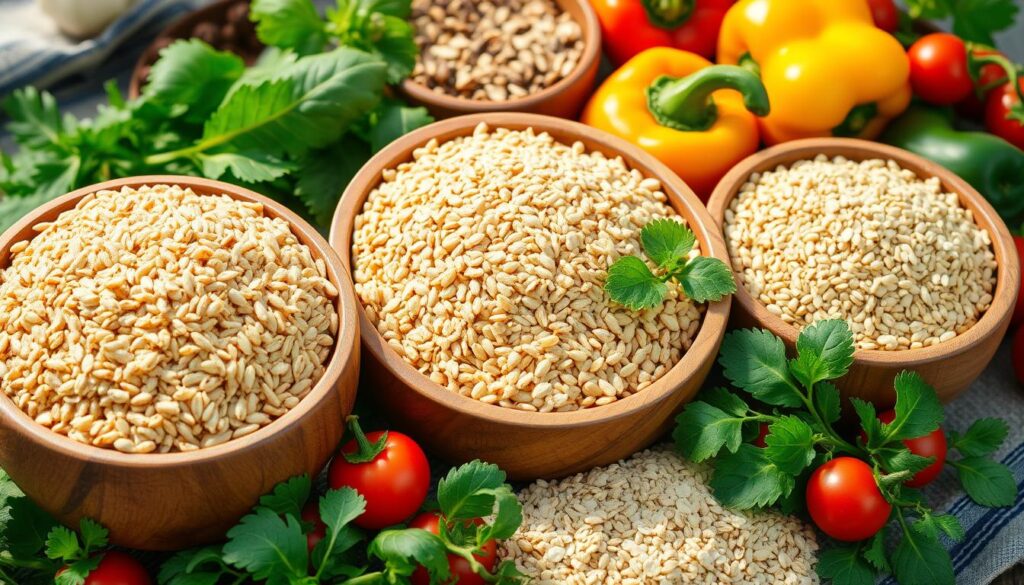
Read more: 7 Simple Tips to Improve Liver Health
Nuts and Seeds
Nuts and seeds are great for liver health. They are full of nutrients that fight fatty liver disease. These superfoods are packed with compounds that help your liver stay healthy.
Nuts for fatty liver like walnuts, almonds, and pistachios are good. They reduce inflammation and improve insulin sensitivity. A big Chinese study showed nuts lower the risk of NAFLD. Eating walnuts also improves liver function tests.
Seeds for fatty liver like flaxseeds, chia seeds, and sunflower seeds are also beneficial. They are full of healthy fats, fiber, and antioxidants. Flaxseeds, for example, have omega-3 fatty acids that fight inflammation and help reduce liver fat.
| Nut/Seed | Potential Benefits for Fatty Liver |
|---|---|
| Walnuts | Reduced inflammation, improved liver function tests |
| Almonds | Decreased postprandial glycemia, insulinemia, and oxidative damage |
| Pistachios | Improved lipid/lipoprotein profile, glycemic control, and endothelial function |
| Flaxseeds | Rich in anti-inflammatory omega-3 fatty acids, may help reduce liver fat |
| Chia Seeds | High in fiber and antioxidants, supporting overall liver health |
Eating different nuts for fatty liver and seeds for fatty liver is tasty and good for your liver. It can help reverse fatty liver disease.
Spices and Herbs
The humble spice rack can hold a wealth of potential remedies for fatty liver disease. Turmeric, with its vibrant golden hue and active compound curcumin, is a standout player. It fights non-alcoholic fatty liver disease NAFLD effectively.
High doses of curcumin, the active ingredient in turmeric, might reduce liver damage markers in NAFLD. Studies show turmeric supplementation can lower serum alanine aminotransferase ALT and aspartate aminotransferase AST levels. These enzymes are high in people with fatty liver disease.
Turmeric and Curcumin’s Liver Protecting Properties
The benefits of turmeric for fatty liver go beyond just reducing liver damage markers. Curcumin, the primary bioactive compound in turmeric, has shown to:
- Reduce inflammation in the liver
- Improve insulin sensitivity
- Decrease oxidative stress
- Inhibit the accumulation of fat in the liver
Other spices and herbs like garlic may also benefit those with fatty liver disease. A 2020 study found that taking 800 mg of garlic powder daily for 15 weeks improved liver fat and enzyme levels in people with NAFLD.

The potential of spices and herbs for fatty liver is an exciting area of research. Ingredients like ginger licorice root, and green tea extract are being studied. As liver disease burden rises globally these natural remedies offer hope for supporting liver health and potentially reversing fatty liver disease.
What foods reverse fatty liver?
Unsaturated Fats and Plant-Based Sources
Making simple dietary changes can help reverse fatty liver disease. Swap saturated fats like butter and fatty meats for unsaturated fats. Choose avocados, olive oil nut butter, and fatty fish instead.
The Mediterranean diet is great for those with fatty liver. It’s full of whole foods and healthy fats. It also includes lots of plant-based foods, which help improve insulin sensitivity and reduce inflammation.
Even a small weight loss of 5-10% can make a big difference. Losing 7% or more of body weight can reduce liver fat inflammation, and liver enzyme levels. Losing 10% of body weight can even improve liver scarring.
| Food Group | Recommended Foods | Benefits for Fatty Liver |
|---|---|---|
| Unsaturated Fats | Avocados, olive oil, nuts, seeds, fatty fish | Help reduce inflammation and insulin resistance |
| Plant-Based Foods | Fruits, vegetables, legumes, whole grains | Provide fiber, antioxidants, and nutrients to support liver health |
By eating foods that reverse fatty liver, like unsaturated fats and plant based foods you can improve your liver health. This is a big step towards better overall health.
Foods to Limit or Avoid
If you have fatty liver disease, your doctor may suggest avoiding certain foods. These include alcohol, added sugars, and fried foods.
Alcohol and Fatty Liver
Drinking alcohol can harm your liver, leading to fatty liver disease. It’s wise to limit alcohol to one drink a day for women and two for men. This helps keep your liver healthy.
Added Sugars and Fatty Liver
High blood sugar can make liver fat buildup worse. Try to cut down on foods and drinks with added sugars. This means less soda, candy, and baked goods.
Fried Foods and Fatty Liver
Fried foods are bad for your liver because they’re full of unhealthy fats and calories. Avoid or limit foods like french fries, fried chicken, and doughnuts.
Also, cut back on processed foods like white bread, rice, and pasta. They can raise blood sugar more than whole grains because they lack fiber.
By changing your diet to include more liver-friendly foods, you can help manage or reverse fatty liver disease.
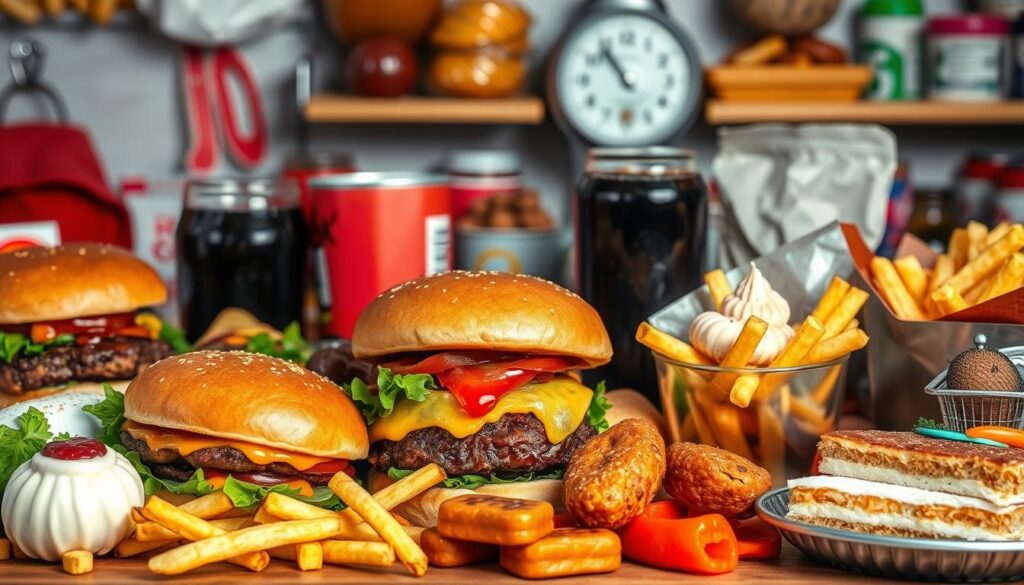
Read more: Liver Cleanse 7 Days to Wellness
Sample Meal Plan
If you’ve been diagnosed with fatty liver disease, a good meal plan can help a lot. A daily menu that supports liver health might include:
Breakfast
- 8 oz. hot oatmeal mixed with 2 tsp. almond butter, 1 tbsp. chia seeds, and 1 cup mixed berries
- 1 cup black coffee or green tea
Lunch
- Spinach salad with balsamic vinegar and olive oil dressing
- 3 oz. grilled chicken
- 1 small baked potato
- 1 cup cooked broccoli, carrots, or other vegetables
Snack
- 1 tbsp. peanut butter on sliced apples
- 2 tbsp. hummus with raw vegetables
Dinner
- Small mixed-bean salad
- 3 oz. grilled salmon
- 1 cup cooked broccoli
- 1/2 cup cooked quinoa
- 1 cup mixed berries
This meal plan for fatty liver includes foods that are good for your liver. They help reduce inflammation and support weight management. By following a diet for fatty liver like this, you can manage your condition better and feel better overall.
Lifestyle Changes for Liver Health
Changing your lifestyle can help your liver health a lot. This includes eating better, exercising, managing your weight, and controlling diabetes.
Exercise for Fatty Liver
Exercise is key for fatty liver disease. The Centers for Disease Control and Prevention CDC says to do 20 to 60 minutes of aerobic activity daily. This can cut down liver fat and inflammation.
Weight Management for Fatty Liver
Getting to a healthy weight is important. Aim to lose 3% to 5% of your body weight. Losing 1 to 2 pounds a week is safe and effective.
Diabetes Control for Fatty Liver
Fatty liver and diabetes often happen together. Eating right and exercising can help control blood sugar. If needed doctors might prescribe medicine to help.
By making these lifestyle changes you can improve your liver health. This can lessen the effects of fatty liver disease.
Conclusion
Improving your diet and making lifestyle changes are key to fighting fatty liver disease. Eat more fruits, veggies, whole grains, beans, and healthy fats like olive oil and avocados. Cut down on alcohol, added sugars, and fried foods.
Regular exercise and managing diabetes and high cholesterol help too. Talk to your healthcare team to create a plan that fits you.
By eating right and making lifestyle changes, you can improve your health. Studies show that diet and lifestyle changes can greatly help with fatty liver disease. This is true for both your health and the world’s.
Even small changes can make a big difference in your liver and overall health. Focus on a healthy diet, exercise, and managing health issues. With the right approach, you can manage fatty liver disease and live a healthier life.
